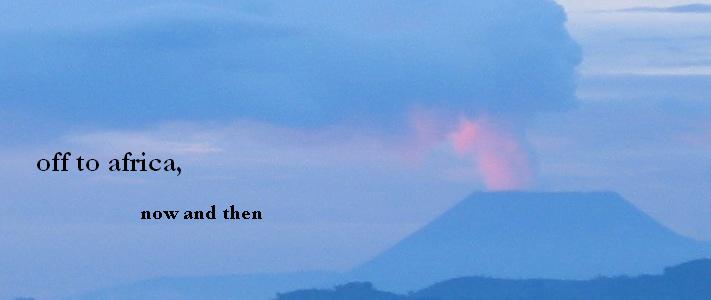I haven't said anything on here about Genocide Memorial Week, which starts on April 7 every year. April 7, 2006 marked 12 years from the start of the genocide in Rwanda.
When I arrived in Rwanda in 2002, the war was just over 8 years past. That seems very different from 12 years, somehow. Kibuye was only recently safe enough to live in. We were only two or three years from needing an army escort to visit the province at all. While I was there, the UN dropped the security level in Kibuye to a one from a three (I know this means nothing to a lot of people, but trust me, a one is safer). Whenever I talked to people, they described things as "avant la guerre" (before the war) or "apres la guerre" (after the war).
I spent my first 9 months in Rwanda not reading about the genocide. I had read some things in college, before I imagined that I would ever go to Rwanda, but I avoided them immediately before leaving and I avoided them after I arrived. Instead, I drove around the country, taking in the green. I hiked up the mountains, watching the smiles. I talked to people, learning the sound of Kinyarwanda even when the words eluded me.
One day in March of 2003, I climbed a mountain and sat in a goat stable on a wooden chair. The old man who owned the house brought me hot roasted corn and we all sat in silence under the tin roof. The rain stopped, but the paths were slick with mud when we finally climbed back down to the car. I slipped and skidded my way down the mountain and across a meadow and as I walked I heard singing from a church somewhere in the fog. In that moment, the war seemed, for the first time, real to me. It was all around me, living in every person I passed. Each person lived it and each person lived with it.
I read the books eventually. I visited the memorials. Not the extremely graphic ones, not Ntarama or the one in Gikongoro. I visited Gisozi and Nyamata and the church on the hill in Kibuye. I sat for a while in the church, with the sunlight reflecting through the stained glass windows on the wall, and I prayed and thought. On another day, I stood outside a mass grave with a friend who told me that his family was buried in it. I stepped down into the concrete tomb to look down the rows of coffins while the guide opened one of them to show us a body that had been thrown into a pit latrine.
And then I went back to the Rwanda I knew first, where the kids cling to my hands and skip past me carrying pans of fruit on their heads and follow me down the road calling, "Muzungu! Amafaranga!" It took me a while, each time. There should be a holding room where you can think about what you've seen and heard before you are plunged back into the bright sun where the school has just let all the kids out to play.
I'm not very good at philosophizing on Africa, largely because I don't like being told what to think about things. I prefer just to hear the stories. I don't want people's interpretations of them. I don't want to pretend that I know or you know how or why things are as they are. And in general, I prefer to focus on the positive things in Africa. The news magazines will give you enough of the bad, if you bother to read about it. I also know that it is not fair to present only my experience years after the war and ignore the words and experiences of the survivors. But this is my blog, and I can only speak for myself. I can't pretend to know what it was like to live through 1994 in Rwanda. I was 14 years old and living in Michigan.
The Rwanda that I know is beautiful and peaceful. I am tempted not to talk about Genocide Week (even a week late) because I don't talk about slavery in the US or civilian deaths in Iraq or other things equally tragic. But I am going to post this anyway, in honor of all Rwandese who are rebuilding their country. It feels wrong to ignore the passing of Genocide Week.
We all still pray for amahoro.
------------------------------------------
Edit: a blog dedicated to the stories of genocide survivors can be found at: Rwandan Survivors.
17 April 2006
Subscribe to:
Post Comments (Atom)

No comments:
Post a Comment